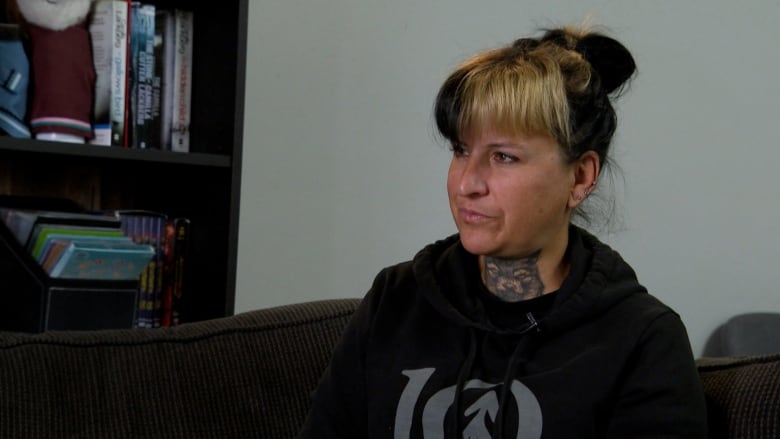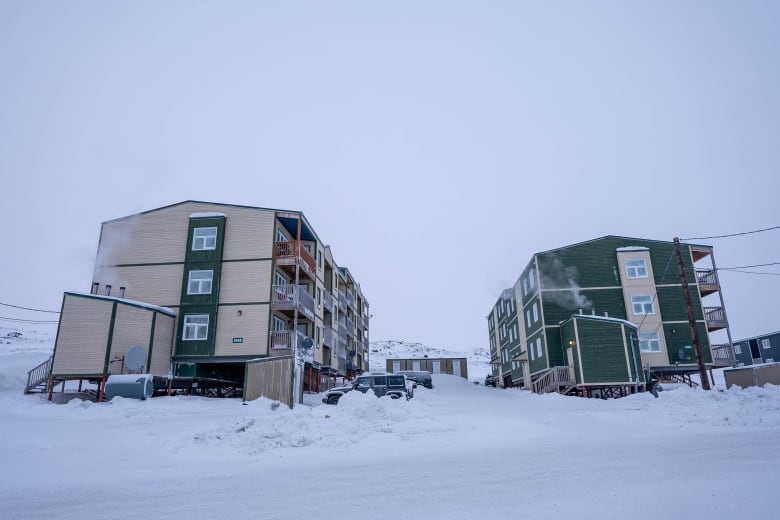
Mosha Cote was over the moon when he finally signed a purchase and sales agreement for a condo on Iqaluit’s Road to Nowhere in July 2023, years after he was first handed the keys to the place.
He and his partner signed the contract on their wedding anniversary and went out for a celebratory dinner. It was supposed to be “our highlight of the year,” he said.
Nine months later came the crushing news — the condo unit was no longer for sale.
“This was just the absolute kick in the pants,” Cote said.
His family of five was among 11 households that began moving into units at 4096 and 4096B Aput Court from December 2019, under the Government of Nunavut’s staff condominium program. That program promised those residents they’d be able to purchase their condo units at below-market prices.
However, residents moved in at the time with no contracts — though they were repeatedly told they were coming.
The territory’s staff condo program began in 2017. The goal was to sell units to employees significantly under market value, in a bid to retain staff and help workers move into the private market.
After he moved into his unit, Cote and his partner put a lot of work into what they thought would be their property, including fixing the vents. Cote worked three jobs to make ends meet.
“There is literal blood, sweat and tears in this unit,” he said.

Then, in April, the Nunavut Housing Corporation (NHC) told residents the condo corporation for the Road to Nowhere units was being dissolved, and those 36 condos were being turned into rentals for Government of Nunavut staff.
NHC president and CEO Eiryn Devereaux said that decision was made for a variety of reasons, including low uptake in the staff condo program, and a shortage of rental units after another building used for staff housing was demolished.
Years of delays
Written agreements for the 11 households in the Road to Nowhere units arrived last year, offering residents the option to lease or to buy.
Only two of those households — including Mosha Cote’s family — chose to buy. Two others, who hadn’t moved in yet, also signed an agreement.
Resident Catherine Tardiff said she expressed interest when they were first offered in January, and continued correspondence until February, but then heard nothing until September 2023 when she was told she had to make a decision.
At the time, she was on parental leave and heading out of the country, so she was unable to engage her lawyers and get a purchase agreement sorted by deadline. Instead she felt forced into signing a lease agreement on the spot.
“They were saying if I wasn’t signing that lease, I wouldn’t have anywhere to live when I come back,” she said.

According to Devereaux, residents had been told that contracts were coming in January that year and they were even given extensions to decide. He also said those residents had already had a few years to think about it.
Devereaux acknowledges there were years of delays in organizing those contracts, with the COVID-19 pandemic, and then $2 million in renovations to the buildings in 2021.
Devereaux, who became NHC president in 2022, says he wished things had moved quicker, earlier. He believes that residents should have signed some sort of agreement — for example, an interim occupancy agreement, or a purchase agreement — when they first moved in.
He said that when he took over in 2022, he started in-person meetings with residents and immediately worked on delivering those sales agreements.
Issues laid out in 3rd-party report
The condominium corporation, while it was still in existence, suffered from a range of issues.
CBC obtained a copy of an October 2022 report by MNP LLP accountants through an access to information request.
The firm was hired by the Nunavut government to investigate a complaint, made a year prior, of “reckless and willful disregard” in the management of the condo project, which was then known as the Iqaluit Condominium Corporation No. 17 (ICC17).
At the time of the report, the authors found NHC was not keeping track of the ICC17’s financial activities, and there was no specific bank account for the corporation until July 2022.
ICC17 itself wasn’t set up until March 2020, four months after the first residents were handed the keys to their units. Some were being charged condo fees even before the corporation was set up.
While the report authors didn’t find evidence of a breach of the government’s ethics code, they did find the NHC failed to adhere to several guiding principles when it promised residents that purchase and sales agreements were forthcoming, “despite there being multiple situations where this was demonstrably false and known to be impossible.”
The management of the project, the report authors said, put the NHC and the Nunavut government at risk, but the reasons were redacted from the copy of the report released to CBC News.
Many of the key personnel involved in the staff condo program have since moved on. Eiryn Devereaux became CEO of the housing corporation after the MNP LLP investigation began.
Allowing people to occupy a unit without any written agreement is not standard practice, he said, and issues with financial records have since been addressed.
Talks of compensation continue
Mosha Cote’s contract is still in dispute.
Devereaux said the closing date for the two sale agreements that were signed had expired prior to the dissolution of the condominium corporation. But Cote questions that, as there were numerous extensions to the closing date.
Deveraux couldn’t comment further on the contracts, but said they’re “still trying to see how we can come to a resolution with those particular two buyers.”
There are 24 two-bedroom condo units which still exist in Iqaluit as part of the staff condo program. They are at the back of the Plateau at 5196 and 5198 Qajisarvik Road.

11 of those are still available, and the NHC has now opened up applications to all Nunavummiut until Sept. 30. Devereaux said all residents at the Road to Nowhere project were invited to apply earlier this year, before it was made available to the public.
Catherine Tardiff had expressed interest in that, but in emails seen by CBC, she was given conflicting information about the deadline. She also says her current unit on the Road to Nowhere is where she feels at home.
“I live next door to the school… a lot of kids come here to sleep, to eat… They feel safe here,” she said. “If I had to move away, there wouldn’t be the same dynamic.”
Cote also says the units at the Plateau, with two bedrooms, wouldn’t work for his family of five.
Looking beyond the staff condo program isn’t a realistic option either for Cote, with how the market has changed over the years since he first joined the condo program.
“I’ll be 50 soon and this was my only track to achieve home ownership,” he said.